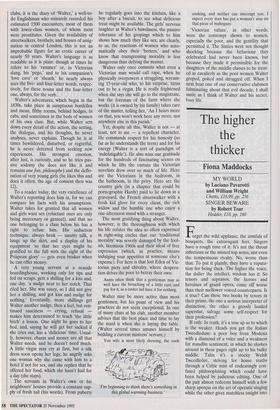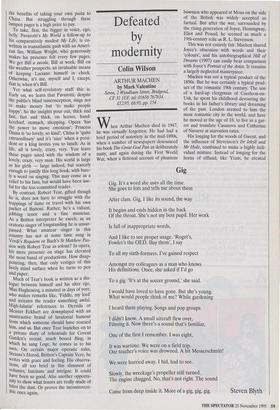The higher the thicker
Fiona Maddocks
MY WORLD by Luciano Pavarotti and William Wright Chatto, £16.99, pp. 256 SINGER BEWARE by Robert Tear Hodder, f18, pp. 180 orget the wild applause, the armfuls of bouquets, the extravagant fees. Singers have a rough time of it. It's not the throat infections or the missed top notes, nor even the tempestuous rivalry. No, worse than that. To put it plainly, they have a reputa- tion for being thick. The higher the voice, the duller the intellect, wisdom has it. So tenors and sopranos, the heroes and heroines of grand opera, come off worse than their mellower voiced counterparts. Is it true? Can these two books by tenors in their prime, the one a serious interpreter of distinction, the other a grossly lauded superstar, salvage some self-respect for their profession?
If only. In truth, it's a toss up as to which is the weaker. Heads you get the Italian Tweedledum: a poor boy from Modena with a diamond of a voice and a weakness for maudlin sentiment, in which he sloshes around in these pages right up to his bulky middle. Tales it's a stocky Welsh Tweedledee, striving for home truths through a Celtic mist of endearingly con- fused philosophising which could have been helped by judicious editing. One of the pair almost redeems himself with a few sharp apergus on the art of operatic singing while the other gives matchless insight into the benefits of taking your own pasta to China. But struggling through these lumpen pages is a high price to pay. To take, first, the bigger in voice, ego, belly. Pavarotti's My World a follow-up to his comparatively modest My Life, is co- written in transatlantic gush with an Ameri- can fan, William Wright, who generously makes his presence felt every few pages. We get Bill a tavola, Bill at work, Bill on the weather prospects, an invaluable means of keeping Luciano himself in check. Otherwise, it's me, myself and I, except, that is, when it's Bill.
Yet what self-revelatory stuff this is. Early on, we learn that Pavarotti, despite the public's blind misconception, sings not to make money but `to make people happy'. So the insights pour out, thick and fast, fast and thick, on horses, hand- kerchief, stomach, shopping. Opera 'has the power to move emotions'; Princess Diana is 'so lovely, so kind'; China is 'quite extraordinary' and it's 'nice' when a presi- dent or a king invites you to lunch. As in life, all is lovely, crazy, very. You leave these pages sated with the wisdom of a lovely, crazy, very man. His world is large as his girth — large indeed, but scarcely enough to justify this long book, with bare- ly a word on singing. This may come as a relief to his fans, but would have been use- ful for the less committed reader.
By contrast, Robert Tear, gifted though he is, does not have to struggle with the trappings of fame or travel with his own packet of Buitoni. Rather, he's a valiant, jobbing tenor and a fine musician. As a Britten interpreter he excels, as an oratorio singer of longstanding he is unsur- passed. What amateur singer in this country has not at some time sung in Verdi's Requiem or Bach's St Matthew Pas- sion with Robert Tear as soloist? In opera, his mere presence on stage has elevated the most banal of productions. How disap- pointing, then, that only vestiges of this lively mind surface when he turns to pen and paper. Much of Tear's book is written as a dia- logue between himself and his alter ego, Max Hughescoq, a minstrel in days of yore, who makes remarks like, 'Fiddle, my lord' and irritates the reader something awful. High-falutin' references to Derrida or Meister Eckhart are downplayed with an unattractive brand of lavatorial humour from which someone should have rescued him, and us. But once Tear launches on to a private diary of rehearsals for Covent Garden's recent, much booed Ring, in which he sang Loge, he comes in to his °Arn. On certain major operatic roles, Strauss's Herod, Britten's Captain Vere, he writes with grace and feeling. His observa- tions, all too brief in this slimmest of volumes, fascinate and intrigue. It could have been so good. Alas another opportu- nity to show what tenors are really made of bites the dust. Or proves the incontrovert- ible once again.



















































































 Previous page
Previous page